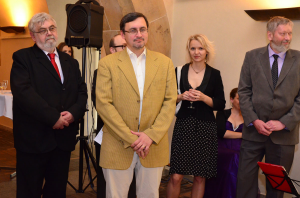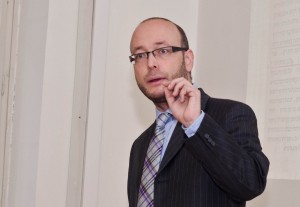This academic year, the students have the opportunity to apply for the MA programme Jewish Studies, which will focus on Jewish culture in Early Modern and Modern period, and on Jewish topics in the Czech Lands with emphasis on Central Europe. The students will gain complex knowledge of modern Jewish culture and its medieval and Early Modern roots, and will also get an understanding of modern Israel. We have asked Professor Jiří Holý and his colleagues from the Prague Centre for Jewish Studies, doc. Pavel Sládek and Dr Marcela Zoufalá, about the details concerning the new programme.
When and how did the idea of a new MA programme start?
The Prague Centre for Jewish Studies, which was founded in 2012, was established with the aim to create and accredit this study programme, and its conception was prepared by the academic council of the Centre. Apart from Professor Holý, doc. Sládek, and Dr Zoufalá, other „founding fathers and mothers“ include Professor Milan Tvrdík, Dr Milan Lyčka, Dr Michala Benešová, Dr Josef Záruba-Pfeffermann, Dr Luboš Velek, and Dr Michal Frankl.
Jewish Studies programmes exist in many European and American universities, and they follow the tradition of Judaic Studies, which is a subject with a long tradition in German-speaking countries. In contrast, Jewish Studies are based on the Anglophone model of study of Jewish culture, with focus on interdisciplinarity and covering all aspects of Jewish culture from the earliest periods up to the present. We have conceived our new programme in such a manner that it would complement the existing programme Hebrew Studies, which deals primarily with Hebrew and in its focus on the older periods of Jewish culture is quite close to Judaic Studies.
The programme Jewish Studies is therefore oriented towards the modern era and examines Jewish thought and culture in a broad way, including such topics as thematizing Jewishness in the majority culture (in our case Czech- and German-speaking) and anti-Semitism. The programme is designed for students who have already earned their BA degree – the most likely candidates being the graduates in Hebrew Studies, Czech Studies and Comparative Literature, German Studies, History, Religious Studies, and other related subjects at other faculties and universities.
Applications are open until 29 February 2016. What sort of background should the applicants have? How can they prepare for the entrance exam?
We expect a general cultural knowledge on the BA study level and a deeper interest in Jewish history and culture, especially in the Czech Lands. The applicants will first write a test (a model test can be found on the website of the Department of Near Eastern and African Studies). Those applicants who succeed in the test will be admitted to the oral exam.
There has been nothing like Jewish Studies at Charles University. Why is this programme unique?
At Charles University (especially at the Faculty of Arts and at theological faculties, mainly the Hussite Theological Faculty), attention has been paid mostly to ancient and medieval Jewish culture. Our new programme connects aspects of research and teaching of several subjects which have so far been treated only separately. However, it is nothing ground-breaking. We are opening this programme now, in 2016, but in USA, Israel, and Western Europe, but also in Leipzig, Budapest, Krakow, Wroclaw and elsewhere, it has been an established discipline for a number of years.
The programme is divided into several ares. Could you tell us more about them? How flexible can the programme be for students?
There are three areas: Jewish Culture and Thought, Jews: Literature and Arts, and Reflecting Judaism and the Jewish Presence. Apart from the basic obligatory courses, we will teach compulsory elective courses, which should allow us to create variations and to cover a broader range of topics. Such inner flexibility of the programme should facilitate better and faster responses to contemporary themes and discussions in the field. Students will be able to choose such subjects which suit their own interests.
As a double-subject programme, it welcomes applicants which are firmly grounded in fields with overlaps into Jewish Studies, and who would like to focus on this „Jewish aspect“, but at the same time do not want to forsake their original subject – for example Czech Literature and Literary Studies, German Studies, Hebrew Studies, Religious Studies, Philosophy, and Central European Studies. All these subjects overlap with Jewish studies, and topics such as „German Jewish literature,“ „Jews and Judaism in Czech literature,“ „responses to the Shoah in Central European cultures,“ and „modern Jewish thought“ can be meaningfully studied in combination with Jewish Studies. Our programme will offer the students not only specialised courses, but also more general lectures and seminar which will help them to get an understanding of the broader context of Jewish history, culture, and religion. An overview of the courses is available on our website, but there might be some changes.
We of course expect that the applicants should have a basic knowledge of either Hebrew or German. During the programme, they will focus on the other of these two languages. Moreover, we will also open courses on the Yiddish language and literature.
Will the programme address the political situation and contemporary developments in Israel?
We would like to acquaint our students with topics which are currently discussed in Israeli and Middle Eastern Studies, primarily in relation to the society and culture of the modern State of Israel. We shall focus on debates about the incorporation of minorities and their rights in relation to the current legislation of the country, and we plan to include also the present divisions of the Jewish society into inter-ethnic groups and the impact of such divisions on socio-cultural processes. The programme also pays attention to the interaction between Israel and the Jewish diaspora, be it in relation to the growth of anti-Semitism, or to the arguments about the halakha. We also want to discuss possible future perspectives, with respect to social and demographic data and the turbulent developments in the Middle East.
There has been a great number of books about Jewish Prague. Are you planning to incorporate contemporary literature on this topic into the programme?
Lectures and seminars on Prague Jewish literature, architecture, music, and arts will be of course part of the programme. Students will be encouraged to choose them as topics for their MA dissertations.
Where could the future alumni look for employment?
Our alumni could look for employment in cultural and educational institutions (publishing, libraries, museums), in the media, and in diplomatic service. The study of Jewish culture had been perceived a peripheral subject for decades, so we think there are good prospects of employment.
The Prague Centre for Jewish Studies has organised a number of interesting events, conferences, and workshops. What are you planning for the next two years?
After several years of existence, the activities of the Centre have become somewhat regular. In autumn, we hold our annual conference which takes different forms: some of the conferences have been smaller, others have been longer and with international participation. Every year, we also organise the Israeli Week at Charles University, which is a more open event, and apart from lectures by Czech and international scholars, the programme always includes student presentations and activities designed to attract the public. A new activity which we would like to carry on is the Prague Colloquy on Hebrew Book, which was held for the second time this year. Apart from these regular events, the Centre organises various guest lectures and is involved in numerous other events at the Faculty of Arts. We also cherish our long-term cooperation with the Jewish Museum in Prague.









